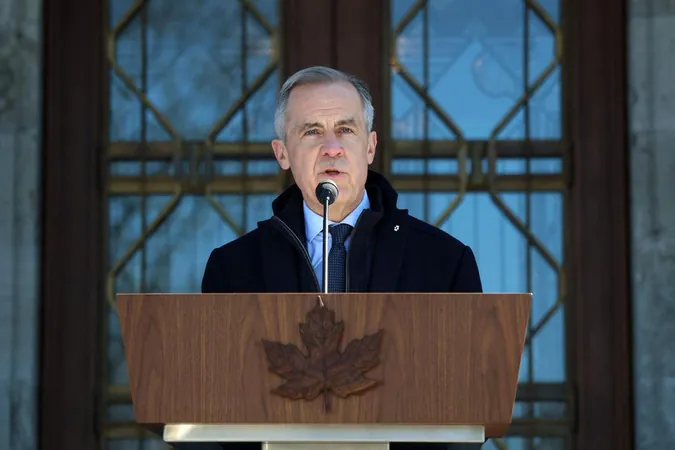
Mark Carney Calls for Snap Election Amidst Tensions with Trump: A Fight for Canada’s Sovereignty
2025-03-24
Author: Wei Ling
OTTAWA – In a stunning political move, newly-appointed Canadian Prime Minister Mark Carney announced a snap election scheduled for April 28. Carney, who took office just days earlier on March 14, indicated that the urgent need for a strong mandate stems from the perceived threat posed by U.S. President Donald Trump, whom he accused of trying to dismantle Canada’s status as a sovereign nation, stating: “He wants to break us so America can own us.”
Relations between Canada and the United States, once characterized by mutual respect and trade partnerships, have significantly deteriorated in recent months, especially as Trump has threatened tariffs and even suggested annexation of Canada as the 51st state. Carney’s comments reflect growing concerns about the impact of Trump's trade policies and rhetoric on Canadian sovereignty.
The upcoming election, originally slated for October, comes as Carney seeks to build on a notable resurgence in support for his Liberal Party. Following the resignation of former Prime Minister Justin Trudeau, who faced criticism over his handling of international relations, Carney has strategically positioned himself in the political landscape, aiming to pivot public focus onto national security against foreign threats.
In a press conference post-election announcement, Carney articulated the urgency of the situation, stating, “We are facing the most significant crisis of our lifetimes because of President Trump’s unjustified trade actions and his threats to our sovereignty. Our response must be to build a strong economy and a more secure Canada. We will not let our identity be compromised.”
As the political landscape heats up, key issues are surfacing. March saw Trump impose tariffs on Canadian steel and aluminum and threaten additional tariffs on goods like dairy products—a move that has raised concerns among Canadians, with many viewing the looming tariffs as a direct threat to their economy.
According to pollster Nik Nanos, these concerns are reflected in polling data: “The number one issue for Canadians is the potential negative fallout from Donald Trump and his trade policies.” Carney's leadership is being scrutinized closely, particularly as he navigates this complex landscape without prior political campaign experience.
In the lead-up to the election, Carney is proposing changes to appeal to voters, including a reduction in the lowest income tax bracket by 1 percentage point. Recent polls indicate a shift in voter sentiment, with the Liberals gaining ground against the Conservative Party, which had previously held the lead.
Interestingly, the Conservatives are portraying Carney as an out-of-touch elite, and their leader, Pierre Poilievre, brings a seasoned political resume to the table. Poilievre, who is fluent in French, stands in contrast to Carney, who faced criticism for his less-than-fluent responses in French during a press conference.
While Carney’s political experience may be limited, experts suggest that the prevailing concern about Trump could lead to a unique election atmosphere where traditional criticisms may be muted in favor of a united front against external threats.
With the campaign officially kicking off, all eyes will be on the evolving dynamics as the election date approaches. The stakes are high, and for Carney, the upcoming weeks will be critical in securing not just a victory, but also the future direction of Canada in a complicated international arena.


 Brasil (PT)
Brasil (PT)
 Canada (EN)
Canada (EN)
 Chile (ES)
Chile (ES)
 Česko (CS)
Česko (CS)
 대한민국 (KO)
대한민국 (KO)
 España (ES)
España (ES)
 France (FR)
France (FR)
 Hong Kong (EN)
Hong Kong (EN)
 Italia (IT)
Italia (IT)
 日本 (JA)
日本 (JA)
 Magyarország (HU)
Magyarország (HU)
 Norge (NO)
Norge (NO)
 Polska (PL)
Polska (PL)
 Schweiz (DE)
Schweiz (DE)
 Singapore (EN)
Singapore (EN)
 Sverige (SV)
Sverige (SV)
 Suomi (FI)
Suomi (FI)
 Türkiye (TR)
Türkiye (TR)
 الإمارات العربية المتحدة (AR)
الإمارات العربية المتحدة (AR)